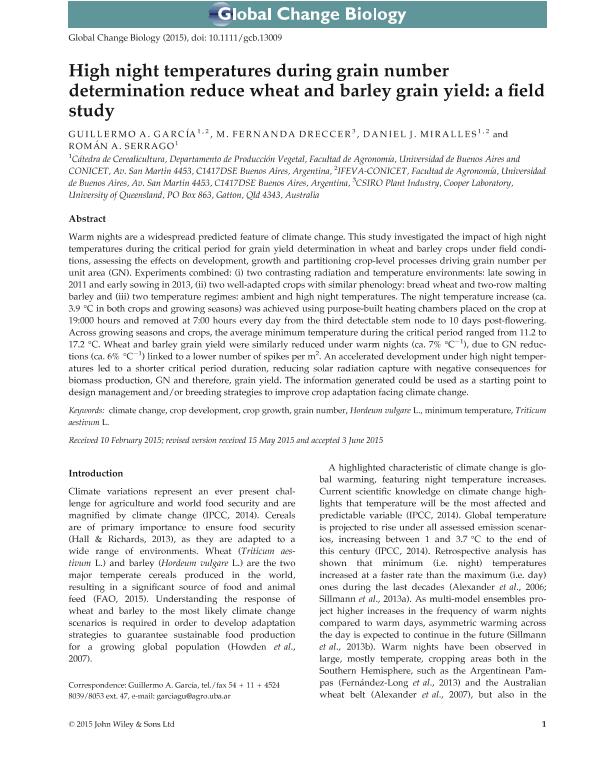Mostrar el registro sencillo del ítem
dc.contributor.author
García, Guillermo Ariel

dc.contributor.author
Dreccer, M. Fernanda
dc.contributor.author
Miralles, Daniel Julio

dc.contributor.author
Serrago, Roman Augusto

dc.date.available
2016-02-17T20:46:14Z
dc.date.issued
2015-04
dc.identifier.citation
García, Guillermo Ariel; Dreccer, M. Fernanda; Miralles, Daniel Julio; Serrago, Roman Augusto; High night temperatures during grain number determination reduce wheat and barley grain yield: a field study; Wiley; Global Change Biology; 21; 11; 4-2015; 4153–4164
dc.identifier.issn
1354-1013
dc.identifier.uri
http://hdl.handle.net/11336/4237
dc.description.abstract
Warm nights are a widespread predicted feature of climate change. This study investigated the impact of high nighttemperatures during the critical period for grain yield determination in wheat and barley crops under field conditions,assessing the effects on development, growth and partitioning crop-level processes driving grain number perunit area (GN). Experiments combined: (i) two contrasting radiation and temperature environments: late sowing in2011 and early sowing in 2013, (ii) two well-adapted crops with similar phenology: bread wheat and two-row maltingbarley and (iii) two temperature regimes: ambient and high night temperatures. The night temperature increase (ca.3.9 °C in both crops and growing seasons) was achieved using purpose-built heating chambers placed on the crop at19:000 hours and removed at 7:00 hours every day from the third detectable stem node to 10 days post-flowering.Across growing seasons and crops, the average minimum temperature during the critical period ranged from 11.2 to17.2 °C. Wheat and barley grain yield were similarly reduced under warm nights (ca. 7% °C1), due to GN reductions(ca. 6% °C1) linked to a lower number of spikes per m2. An accelerated development under high night temperaturesled to a shorter critical period duration, reducing solar radiation capture with negative consequences forbiomass production, GN and therefore, grain yield. The information generated could be used as a starting point todesign management and/or breeding strategies to improve crop adaptation facing climate change.
dc.format
application/pdf
dc.language.iso
eng
dc.publisher
Wiley

dc.rights
info:eu-repo/semantics/openAccess
dc.rights.uri
https://creativecommons.org/licenses/by-nc-sa/2.5/ar/
dc.subject
Wheat
dc.subject
Barley
dc.subject
Temperatire
dc.subject.classification
Agricultura

dc.subject.classification
Agricultura, Silvicultura y Pesca

dc.subject.classification
CIENCIAS AGRÍCOLAS

dc.title
High night temperatures during grain number determination reduce wheat and barley grain yield: a field study
dc.type
info:eu-repo/semantics/article
dc.type
info:ar-repo/semantics/artículo
dc.type
info:eu-repo/semantics/publishedVersion
dc.date.updated
2016-03-30 10:35:44.97925-03
dc.journal.volume
21
dc.journal.number
11
dc.journal.pagination
4153–4164
dc.journal.pais
Estados Unidos

dc.journal.ciudad
Hoboken
dc.description.fil
Fil: García, Guillermo Ariel. Consejo Nacional de Investigaciones Científicas y Técnicas. Oficina de Coordinación Administrativa Parque Centenario. Instituto de Investigaciones Fisiológicas y Ecológicas Vinculadas a la Agricultura; Argentina. Universidad de Buenos Aires. Facultad de Agronomía. Departamento de Producción Vegetal. Cátedra de Cerealicultura; Argentina
dc.description.fil
Fil: Dreccer, M. Fernanda. University of Queensland. Cooper Laboratory. CSIRO Plant Industry; Australia
dc.description.fil
Fil: Miralles, Daniel Julio. Consejo Nacional de Investigaciones Científicas y Técnicas. Oficina de Coordinación Administrativa Parque Centenario. Instituto de Investigaciones Fisiológicas y Ecológicas Vinculadas a la Agricultura; Argentina. Universidad de Buenos Aires. Facultad de Agronomía. Departamento de Producción Vegetal. Cátedra de Cerealicultura; Argentina
dc.description.fil
Fil: Serrago, Roman Augusto. Universidad de Buenos Aires. Facultad de Agronomía. Departamento de Producción Vegetal. Cátedra de Cerealicultura; Argentina
dc.journal.title
Global Change Biology

dc.relation.alternativeid
info:eu-repo/semantics/altIdentifier/url/http://onlinelibrary.wiley.com/doi/10.1111/gcb.13009/abstract
dc.relation.alternativeid
info:eu-repo/semantics/altIdentifier/doi/http://dx.doi.org/DOI:10.1111/gcb.13009
dc.relation.alternativeid
info:eu-repo/semantics/altIdentifier/issn/1354-1013
Archivos asociados
